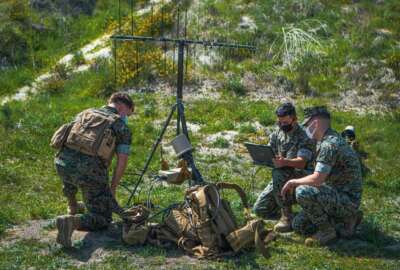Fed-turned-academic is now back helping the Defense Department
The Center for Government Contracting at George Mason University won a contract to help the Undersecretary of Defense for Research and Engineering review the...
Best listening experience is on Chrome, Firefox or Safari. Subscribe to Federal Drive’s daily audio interviews on Apple Podcasts or PodcastOne.
A leading academic program concerned with Federal Acquisition has become something of an adviser to the government, to the Defense Department in particular. The Center for Government Contracting – part of George Mason University’s Business School – has won a contract. It will help the Undersecretary of Defense for Research and Engineering review the contracting activities of DARPA, and of the Defense laboratories. Center Executive Director Jerry McGinn had the details on Federal Drive with Tom Temin.
Interview transcript:
Tom Temin: Jerry, good to have you back.
Jerry McGinn: Great to be back with you, Tom.
Tom Temin: So you have won a contract. It’s not huge, it’s less than $1 million, but it’s unusual for an academic situation to go in and advise like this, at least in my experience. What will you be doing for the Defense Department?
Jerry McGinn: Well, this came – it was directed by Congress in the FY 2020 National Defense Authorization Act, they asked for a university, a business school or law school to do this work. So the Department of Defense did the contracting activity. And we were fortunate to be selected. We have in our business school, as you say, we have a lot of expertise in intellectual property. Our senior fellow Jim Hasik, who’s leading this, the principal investigator for this study, has written a number of papers on this, and our law school has two programs: the Center for Protection of Intellectual Property, as well as the National Security Institute. And we partner with them on this, and we’re really excited about this project.
Tom Temin: Yes. So the unique part of acquisition by DARPA, and Defense laboratories is they’re not buying the typical things that DoD buys. They are buying, essentially, intellectual property?
Jerry McGinn: Right. So this has been a big move within an apartment, actually. There have been a number of efforts in the last several years to rethink how Department of Defence does acquisition, intellectual property policy. They’ve got new instruction out. And this is part of that piece of, how can the Department of Defense do better and partner with industry. So it’s less of a all-or-nothing kind of approach for intellectual property.
Tom Temin: That is to say, either the government buys up what it is and keeps it and there’s not that much incentive for the intellectual property generator. Or the government can’t get the most out of it, because it has no rights to the intellectual property on the two extremes. So they’re trying to steer between those two extremes?
Jerry McGinn: Exactly. It’s getting that balance, right. And I think government needs to get better as a consumer or as a purchaser of intellectual property. And industry also has to come meet in the middle to some degree through licensing rights or figuring out a model to do it. And I think you’re seeing that in this study, and a lot of activities going on between department and industry – there’s a real effort to do that.
Tom Temin: And how does this fall under Research and Engineering, say, instead of the industrial base policy?
Jerry McGinn: Because this study itself is focusing on DARPA and the Defense labs, so that it’s very much a, kind of research and engineering kind of – that they’re responsible for those. And it’s in the office of laboratories that this project is being managed by, so it makes a lot of sense. But as you say, this is not just an R&D problem. It’s across the department.
Tom Temin: Now, earlier, you spent a good three year stint in the Defense Department. Are people from DARPA and the lab saying, Jerry, stay out of here don’t upset the apple cart.
Jerry McGinn: Well, they haven’t yet. They’ve given us the order does the work and we’re off. And we’re actually been partnering with there’s an IP cadre that’s been stood up in the Department of Defence led by, yes, Richard Gray. And they’re partnered with industry on this and with academia to try and find solutions. And I think there’s a real opportunity for the new incoming undersecretary for acquisition and sustainment to really drive this kind of issue. And hopefully, there’ll be one nominated soon for that role.
Tom Temin: We’re speaking with Jerry McGinn, Executive Director of the Center for Government contracting part of George Mason University’s business school. And under the contract, what specific activities will your folks be doing?
Jerry McGinn: Yeah we’ll be doing a major kind of review of all the practices of existing defense labs and DARPA, with regard to intellectual property and technology transfer. And so we’re gathering data from that in a lot of interviews, it’s a short term response department has to get back to Congress by the late spring. So we’re excited to be doing this. And we’re excited to be partnering with the Department of Defence on this.
Tom Temin: In Washington terms late spring is a sprint from now.
Jerry McGinn: Yeah, it is, it is. And we’re fortunate, we’re kind of sprinting right now through this effort, and we’re making very good progress.
Tom Temin: And will you be also talking to the contractors or the grantees, the people that generate the intellectual property?
Jerry McGinn: I think this is focusing on the practices of the laboratories and DARPA itself. So it’s looking at commonality, trying to identify best practices to make recommendations to research and engineering as to what can the department do? What’s the best practices going forward? And it’s up for them to make that decision based on the results that we report and potential recommendations.
Tom Temin: And of course, there’s a lot of intellectual property acquisition that happens on the civilian side of government. Will that be a point of reference also for you to compare and contrast?
Jerry McGinn: Not in this specific effort? Well, there is we’re looking at basic academic based practice and intellectual property. This could inform the lit review for this study. But there’s definitely activities that need to be happening across the government, looking at this area. Because the way technology is going and how it impacts government activities. This balance of intellectual property between government and industry is going to grow in coming years, not going to go away.
Tom Temin: Does this have to do in some sense, or in some part with the need for a new strategic offset?
Jerry McGinn: I think that you’re hitting on the right point, Tom. There’s been, if you go back and look at in the Cold War, GPS and these kinds of technologies came from defense investments. So defense as a percentage of R&D overall in the United States is much less. So you’re seeing much more commercial technology, hypersonics, artificial intelligence, machine learning, autonomy, robotics, a lot of it’s commercial now, but it’s also a defense application. So the Department of Defense is actually going into commercial companies to look to bring this technology in. And there’s been actually a decrease in some of the new entrants in the last couple years. So we’re trying to get the balance right as to the incentives for companies and intellectual property as part of that. They want to be able to keep their technology, their know-how that allows them to grow. But also department needs some kind of ability to maintain and adapt systems as they need. So it’s getting that balance, right. And that’s been a big focus of a lot of acquisition reform.
Tom Temin: And that’s a big difference, in some sense, from the Cold War, say, if you were buying stealth technology that was bought with the understanding on both sides, this is exclusively for the Defense Department.
Jerry McGinn: Right.
Tom Temin: Because, well, I don’t know why anyone would want a stealth airliner if you want to be safely landing under radar. But the point is, a lot of those technologies were proscribed from sale to the private sector, let alone around the world. In this case, it seems like the Defense Department has reversed that idea where they want to be a user of the IP, but let it be also available from the creator for other uses in the commercial area.
Jerry McGinn: That’s correct. You’re seeing these, there’s a lot of heavily commercial areas like robotics, and even some of the pieces of defense equipment such as micro electronics or rare earth elements. These are critical for defense systems. But the defense is like 1% of the market in some of these materials. And on the commercial areas, it’s the same set of dynamics. So you’ve got to find a balance, so you can incentivize companies to come in. So you have the latest take you can. You have to have the adapted acquisition systems to be able to upgrade those, and so on and you have to have intellectual property practices that also enable you to get what you need, but not get more than what you need. So it’s really kind of helping the department or the government, in general, become a better consumer of intellectual property. Because you don’t want to – if they buy everything, then what you just mentioned earlier, you disincentivize companies or you only get certain companies. Whereas if you find kind of mutually agreeable solutions through licensing rights or something, and find the place to do that in the system, is really critical. And that’s a lot of discussions were going on now. And the study that we’re doing is a piece of that kind of puzzle to really kind of help the department and the government improve how it does these practices and keeps the industrial base dynamic and serving commercial and defense companies.
Tom Temin: And then the flip side, and we’ll conclude here is that, you also don’t want the same technology sold and used in the same way to the – I don’t know – Venezuelan Air Force or whatever the case might be, people that are not friendly to the United States. You don’t want them to buy the same thing and develop the same capability. Because then there’s no offset. So it’s a fine grained kind of pathway they have to thread there, isn’t it?
Jerry McGinn: There is, I mean, because yeah, there’s the whole issue of micro electronics and different technologies that are made in China or other unfriendly places. So how do you balance that – it’s not quite a struggle, but it’s a challenge. And it’s something that the Department of Defense has to do business with companies that are willing just to do business, can stay out of that realm. Because security is a big part of this, with cybersecurity and all, you got to build these systems and you got to have them protected.
Tom Temin: Small contract, big implications.
Jerry McGinn: We’d like to think so.
Tom Temin: Alright, Jerry McGinn is executive director of the Center for Government Contracting part of George Mason University’s Business School. Thanks so much for joining me in studio.
Jerry McGinn: Great to be here.
Copyright © 2025 Federal News Network. All rights reserved. This website is not intended for users located within the European Economic Area.
Tom Temin is host of the Federal Drive and has been providing insight on federal technology and management issues for more than 30 years.
Follow @tteminWFED






